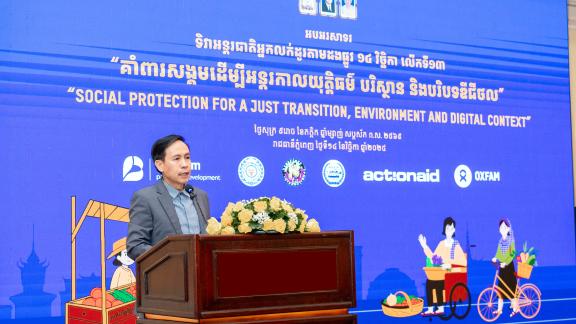On the 13th International Street Vendors Day, the Ministry of Laour and Vocational Training, the Independent Democratic Association of the Informal Economy (IDEA) and Oxfam united to spotlight the critical need for inclusive social protection systems that recognize and support Cambodia’s street vendors. These workers are a cornerstone of the informal economy, contributing significantly to national food security, local employment, and community resilience.
The forum organized today, November 14, 2025, offers street vendors a platform to engage in dialogue, share their working conditions and challenges, and contribute to efforts aimed at improving labor standards and overall welfare. These discussions play a vital role in strengthening Cambodia’s social protection framework, ensuring that street vendors are not left behind as the country advances toward a green and digital economy.
Held under the theme “Social Protection for a Just Transition, Environment and Digital Context,” under the presidency of H.E. Sour Heng, Minister of Labor and Vocational Training, and more than 250 participants, including street vendors, informal economy workers, civil society organizations, government officials, and development partners.
Globally, the street vendor market is projected to grow from $2.68 billion in 2024 to $4.73 billion by 2029, driven by rising innovation and consumer demand. Yet behind these figures lies a sobering reality: more than 60% of the global labor force operates in the informal sector, often without access to adequate social support. According to 2021 data from the National Institute of Statistics, 49% of workers were self-employed including street vendors, while 36% were classified as employees and 15% as unpaid family workers.
In Cambodia, the situation is even more pronounced. According to the National Institute of Statistics (2021), 88.3% of workers are engaged in the informal economy, with street vending serving as a primary livelihood for many. Employment data shows that 49% are formally employed, 36% are self-employed including street vendors, and 15% are unpaid family workers.
Street vendors play an active role in supporting both family livelihoods and the national economy. They are entitled to the same rights as other workers, including equitable access to social protection and welfare systems. This includes health insurance, childcare, maternal protection, education, hygiene and safety at their workplaces, and access to financial services, all of which are essential and must be prioritized.
Recent policy developments including the launch of the Digital Social Protection System and the expansion of voluntary health care contributions for self-employed workers represent important steps forward. However, many street vendors remain excluded from formal protections. Oxfam and IDEA call for a more inclusive approach that ensures social protection schemes are accessible, effectively implemented, and responsive to the realities of informal workers.

Ms. Sophoan Phean, Oxfam National Director. Photo: Oxfam
Ms. Sophoan Phean, Oxfam National Director, emphasized the importance of recognizing street vendors as key contributors to Cambodia’s development. “Street vendors are the backbone of Cambodia’s informal economy. They work long hours in difficult conditions to provide food, goods, and services that sustain our communities. Yet they remain among the most vulnerable and least protected. We must ensure that social protection systems are designed to include them not as an afterthought, but as a priority. Their resilience and contributions deserve not only recognition but meaningful support.”

Mr. Pov Vorn, President of IDEA. Photo: Oxfam
Mr. Pov Vorn, President of IDEA, said, “Every day, street vendors face challenges that threaten their livelihoods and dignity. Despite frequent disruptions and unsafe working conditions, social protection mechanisms such as social security and social assistance systems are in place, yet their applicability to street vendors remains limited. Moreover, many vendors are still unable to afford social security packages for themselves or their families. As a result, their struggle continues in the pursuit of social protection that truly addresses their needs.”.

H.E. Sour Heng, Minister of the Ministry of Labour and Vocational Training. Photo: Oxfam
Ms. Saveun Mean, said, “I’ve been selling noodles on the street for over ten years. It’s how I feed my family and send my children to school. But we face many problems: no health insurance, no safety, and no support when business is slow or disasters happen. We need a system that protects us when life gets hard.”
In addition, climate change has been affecting street vendors, such as high temperatures and air pollution, which can affect not only their health but also their income. With the digital revolution in Cambodia, it has been changing their economic operations, especially through online shopping, low-level digital technology knowledge and high-cost internet costs, it have become a burden and a risk for them.
As the Cambodian government prepares to adapt and build resilience to climate change, we see a gap in fair interaction for street vendors. Fair interaction is to ensure that policies related to climate changes, the digital economy and social support systems must invest in mechanisms that support and protect street venders, which requires them to be part of the policy-related dialogue.
Oxfam and IDEA reaffirm their commitment to working with all stakeholders to build a more just, inclusive, and resilient Cambodia where the contributions of street vendors are valued and their rights are upheld

Panel discussion on "Social Protection Policies and The Development in The Digital Context." Photo: Oxfam
